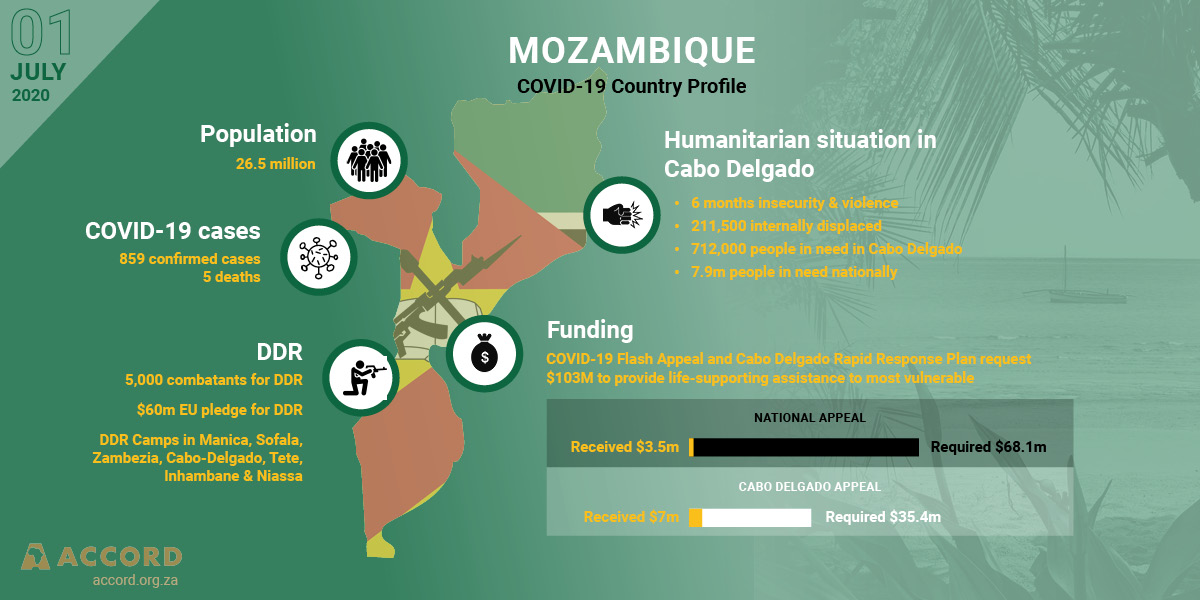Mozambique’s definitive third peace agreement, known as the Peace and National Reconciliation Agreement, was signed by the President of Mozambique, Filipe Jacinto Nyusi and Resistência Nacional Moçambicana (Renamo) leader Ossufo Momade on 6 August 2019. After the signing, there were notable slowdowns and very limited progress was made. However, there has recently been some movement on the implementation of the agreement. Most of the noticeable progress has been around the disarmament, demobilisation and reintegration (DDR) process of Renamo forces. In the first weeks of June 2020, the government and Renamo demobilised about 300 combatants at its base in Savane, Sofala Province. This was an important step towards building trust between the parties, as it signalled the possible realisation and expectation that the rest of Renamo’s 16 military bases (totalling around 5 000 Renamo guerrillas) will be progressively closed this year.
However, these advances in the DDR process in Mozambique must be considered within the context of the COVID-19 pandemic. Although it is still unclear how the implementation of the peace agreement will be affected in the medium term, it is becoming increasingly predictable that the effects of COVID-19 will slow the pace once again at which the DDR process will proceed. This may affect the entire calendar and schedule of activities. Realistically, the demobilisation calendar, which is already behind schedule, will need a reclarification and redefinition of the deadlines, as the DDR process will certainly not be completed this year as previously planned.
Through innovative thinking and community solidarity, we have devised a way where learners can receive education in a safe manner.
Tweet
Currently, the levels and characteristics of COVID-19 transmission in the country show a transition from outbreaks to community spread. In addition to demanding more restrictive measures, these levels of transmission may cause a climate of panic and disrupt the demilitarisation process. On the other hand, due to the characteristic agglomerations of the cantons in the military bases, the vulnerability and potential risks of mass contamination among the military and support personnel are increasingly evident.
Another concerning aspect that may result from extending the calendar is the increase in additional DDR logistics costs, as an extension implies a longer stay of the military in the remaining 15 Renamo bases and additional days required for the functioning of the demobilisation camps. This aspect will necessarily require an intensified effort in logistical support by both the government and international partners in the provision of food, accommodation and access to health services, including hygiene and prevention kits for COVID-19, among others.
However, the DDR process is taking place at a time when efforts to control the COVID-19 pandemic are being considered a priority. Therefore, public and donor funds are being redirected to public health, to the detriment of other national priorities. A week before the restart of the DDR process, the UN Secretary-General’s Personal Envoy for Mozambique, Mr Mirko Manzoni, who is also the chairperson of the Contact Group composed of diplomatic community in Mozambique pointed out that while the international community supported the resumption of the DDR process, the priority had to be combating COVID-19.
To further compound an already complex situation, the measures taken to contain the spread of the virus are affecting the mobility of members of the technical group that is in charge of implementing the DDR process. Although new ways of working have been adopted, it is clear that this will impact on the speed of the process.
At a community level, the process of reintegration and socialisation of former Renamo guerrillas is impacted by the need to comply with state of emergency measures, particularly with regard to social distancing and the prohibition on holding meetings of more than 20 people. These limitations may inhibit some social practices, the reception of the community to these former guerrillas, and may also create instances of stigmatisation, resulting from a not very welcoming community. There is a need to find a balance between the realisation of the DDR process and the preservation of public health.
However, it is commendable that in spite of the COVID-19 pandemic, the DDR process, despite having slowed down, has not ground to a halt. It will still be conducted, albeit in a phased manner, until the 5 000 Renamo fighters are reintegrated. The deactivation of the Savane base is an important demonstration of the political will between the parties and a clear demonstration that the process will continue, despite the trials presented by COVID-19. One of the major challenges will be the need to maintain constant communication and interaction between the two parties and the various actors involved in the DDR process, so that everyone is informed about the delays caused by COVID-19.

